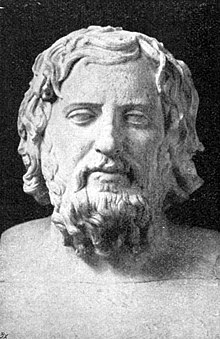 Xenophon of Athens (/ˈzɛnəfən, -ˌfɒn/; Greek: Ξενοφῶν Greek pronunciation: [ksenopʰɔ̂ːn], Xenophōn; c. 430–354 BC) was an ancient Greek philosopher, historian, soldier and mercenary, and a student of Socrates.[1] As a historian, Xenophon is known for recording the history of his contemporary time, the late-5th and early-4th centuries BC, such as the Hellenica, about the final seven years and the aftermath of the Peloponnesian War (431–404 BC); as such, the Hellenica is a thematic continuation of the History of the Peloponnesian War, by Thucydides. As a mercenary soldier of the Ten Thousand, he participated in the failed campaign of Cyrus the Younger, to claim the Persian throne from his brother Artaxerxes II of Persia, and recounts the events in Anabasis (An Ascent), his most notable history.
Xenophon of Athens (/ˈzɛnəfən, -ˌfɒn/; Greek: Ξενοφῶν Greek pronunciation: [ksenopʰɔ̂ːn], Xenophōn; c. 430–354 BC) was an ancient Greek philosopher, historian, soldier and mercenary, and a student of Socrates.[1] As a historian, Xenophon is known for recording the history of his contemporary time, the late-5th and early-4th centuries BC, such as the Hellenica, about the final seven years and the aftermath of the Peloponnesian War (431–404 BC); as such, the Hellenica is a thematic continuation of the History of the Peloponnesian War, by Thucydides. As a mercenary soldier of the Ten Thousand, he participated in the failed campaign of Cyrus the Younger, to claim the Persian throne from his brother Artaxerxes II of Persia, and recounts the events in Anabasis (An Ascent), his most notable history.
Despite being an Athenian citizen, born to Gryllus, of the deme Erchia of Athens, Xenophon of Athens also was associated with city-state of Sparta, the traditional enemy of Athens. As such, his pro-oligarchic politics, military service under Spartan generals, in the Persian campaign and elsewhere, and his friendship with King Agesilaus II endeared Xenophon to the Spartans; thus, some of his works have an admiring pro–Spartan bias, especially the royal biography Agesilaus and the Constitution of the Spartans.
Besides the philosopher Plato (427–347 BC), Xenophon of Athens is an authority on Socrates, about whom he wrote the dialogue Apology of Socrates to the Jury, which recounts the Trial of Socrates (399 BC). The works of Xenophon are in several genres, and are written in plain-language Attic Greek, for which reason they serve as translation exercises for contemporary students of the Ancient Greek language. In the Lives and Opinions of Eminent Philosophers, Diogenes Laërtius said that, as a writer, Xenophon of Athens was known as the “Attic Muse”, for the sweetness of his diction (2.6).
---------------------------------------------------------------------------------------------
Anabasis (/əˈnæbəsɪs/; Greek: Ἀνάβασις Greek pronunciation: [anábasis] (literally an "expedition up from")[1] is the most famous work, published in seven books, of the Greek professional soldier and writer Xenophon. The text was composed around the year 370 BC, and in translations, Anabasis is rendered The March of the Ten Thousand or The March Up Country. The journey it narrates is his best known accomplishment and "one of the great adventures in human history", as Will Durant expressed it.[2]
-----------------------------------------------------------------------------------------
The Cyropaedia, sometimes spelled Cyropedia, is a partly fictional biography[1] of Cyrus the Great, written around 370 BC by the Athenian gentleman-soldier, and student of Socrates, Xenophon of Athens. The Latinized title Cyropaedia derives from Greek Kúrou paideía (Κύρου παιδεία), meaning "The Education of Cyrus". Aspects of it would become a model for medieval writers of the genre known as mirrors for princes. In turn it was a strong influence upon the most well-known but atypical of these, Machiavelli's The Prince, which was an important influence in the rejection of medieval political thinking, and the development of modern politics. However, unlike most "mirrors of princes", and like The Prince, whether or not the Cyropaedia was really intended to describe an ideal ruler is a subject of debate.
No comments:
Post a Comment